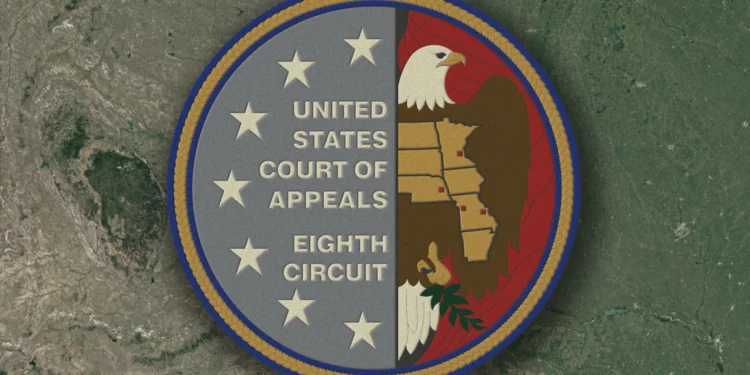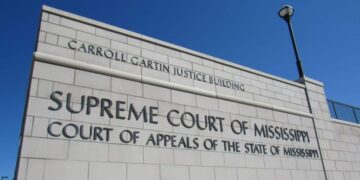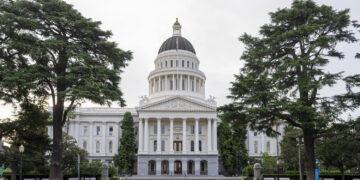July 4, 2025 Story by: Publisher
A federal appeals court has declined to revisit a controversial decision that bars private individuals and groups from suing to enforce Section 2 of the Voting Rights Act—a key civil-rights safeguard aimed at preventing racial discrimination in voting. The ruling impacts seven Midwestern states in the jurisdiction of the 8th U.S. Circuit Court of Appeals (Arkansas, Iowa, Minnesota, Missouri, Nebraska, North Dakota and South Dakota).
The order released Thursday, July 3rd, by the 8th U.S. Circuit Court of Appeals sets up a potential Supreme Court appeal of a three-judge panel’s ruling, which was released in May.
The 8th Circuit, which made a similar decision last year in a related Arkansas redistricting case, did not explain its latest reasoning. But its order noted that, as in the Arkansas case, Chief Circuit Judge Steven Colloton and Judge Lavenski Smith — both nominated by former President George W. Bush — and Judge Jane Kelly, a nominee of former President Barack Obama, would have granted the request to review the ruling.
A decisive blow to private enforcement
On May 14, 2025, a three‑judge panel confirmed a prior 2023 ruling holding that Section 2 of the Voting Rights Act does not unambiguously grant private parties a right to sue, either directly or by leveraging Section 1983 of the Civil Rights Act of 1871.
Section 2 prohibits voting laws, practices, or procedures that discriminate based on race, color or language minority status. Section 1983, meanwhile, allows individuals to sue state officials for otherwise enforceable rights. For decades, plaintiffs used 1983 to litigate discrimination under Section 2. But in 2023, the 8th Circuit held that private plaintiffs have no Section 2 claim at all. The May decision goes further: even the back‑door route via Section 1983 is closed unless the law explicitly gives a private right—something the majority found Section 2 lacks.
Because the Voting Rights Act’s Section 2 does not unambiguously confer an individual right, the plaintiffs do not have a cause of action under Section 1983 of Title 42 of the U.S. Code to enforce Section 2 of the Act,” wrote Circuit Judge Raymond Gruender, who was nominated by former President George W. Bush and joined in the opinion by Circuit Judge Jonathan Kobes, a nominee of President Trump.
That statute gives individuals the right to sue state and local government officials for violating their civil rights. Section 1983 stems from the Ku Klux Klan Act that Congress passed after the Civil War to protect Black people in the South from white supremacist violence, and voting rights advocates have considered it an antidote to a controversial 2023 decision by a different federal appeals panel that made it harder to enforce Section 2 in the 8th Circuit.
In 2023, a separate Eighth Circuit panel significantly limited Section 2 enforcement by ruling that the Act does not itself confer a private right of action. Plaintiffs thereafter relied on Section 1983 to carry forward most Voting Rights Act cases in the circuit.
Wednesday’s ruling closes even that avenue, siding with Republican state officials who argued that Section 1983 permits suits only for rights “unambiguously” established by Congress—and that Section 2 does not meet that threshold because it does not explicitly authorize private enforcement.
The 8th Circuit ruling stemmed from a redistricting lawsuit filed in December 2021 on behalf of the Arkansas State Conference of the NAACP and the Arkansas Public Policy Panel. The groups alleged that a state House map passed after the release of 2020 census data weakened the impact of Black votes, which violates Section 2 of the VRA.
North Dakota tribes see victory undone
The ruling overturns a 2023 North Dakota district‑court decision that found the state’s 2021 legislative redistricting diluted Native American voting strength. That lower‑court order reshaped districts to boost representation, resulting in the election of three Native legislators.
But the 8th Circuit reversed. It instructed the district court to dismiss the suit—not on the merits of discrimination, but due to the absence of a private enforcement pathway.
Circuit conflict deepens—Supreme Court may be next
The 8th Circuit now stands alone among appellate courts in restricting both Section 2 and Section 1983 pathways for private lawsuits.
Other circuits, and the Department of Justice, still allow Section 2 suits via 1983. If not resolved, this jurisdictional split will likely force the Supreme Court to intervene.
What lies ahead for voters and lawmakers
With private enforcement curtailed, communities will now depend on DOJ action—a significant barrier in politically polarized environments. Without DOJ lawsuits, discriminatory maps may go unchecked.
In North Dakota, state officials plan to revert to the 2021 map in 2026 unless a rehearing or Supreme Court reversal intervenes.
Tribal leaders have already petitioned the full 8th Circuit for rehearing en banc. Plaintiffs may also appeal to the Supreme Court. The stakes are high: without private legal standing, voters lose critical avenues to challenge gerrymandering and discrimination.
Source: AP News / NPR / US Courts.gov

















